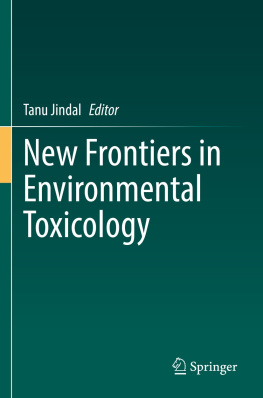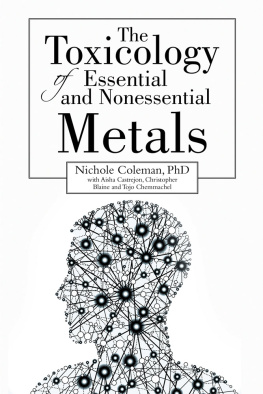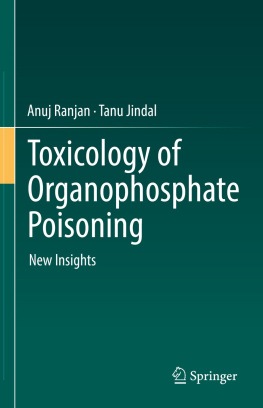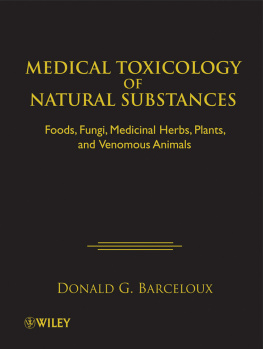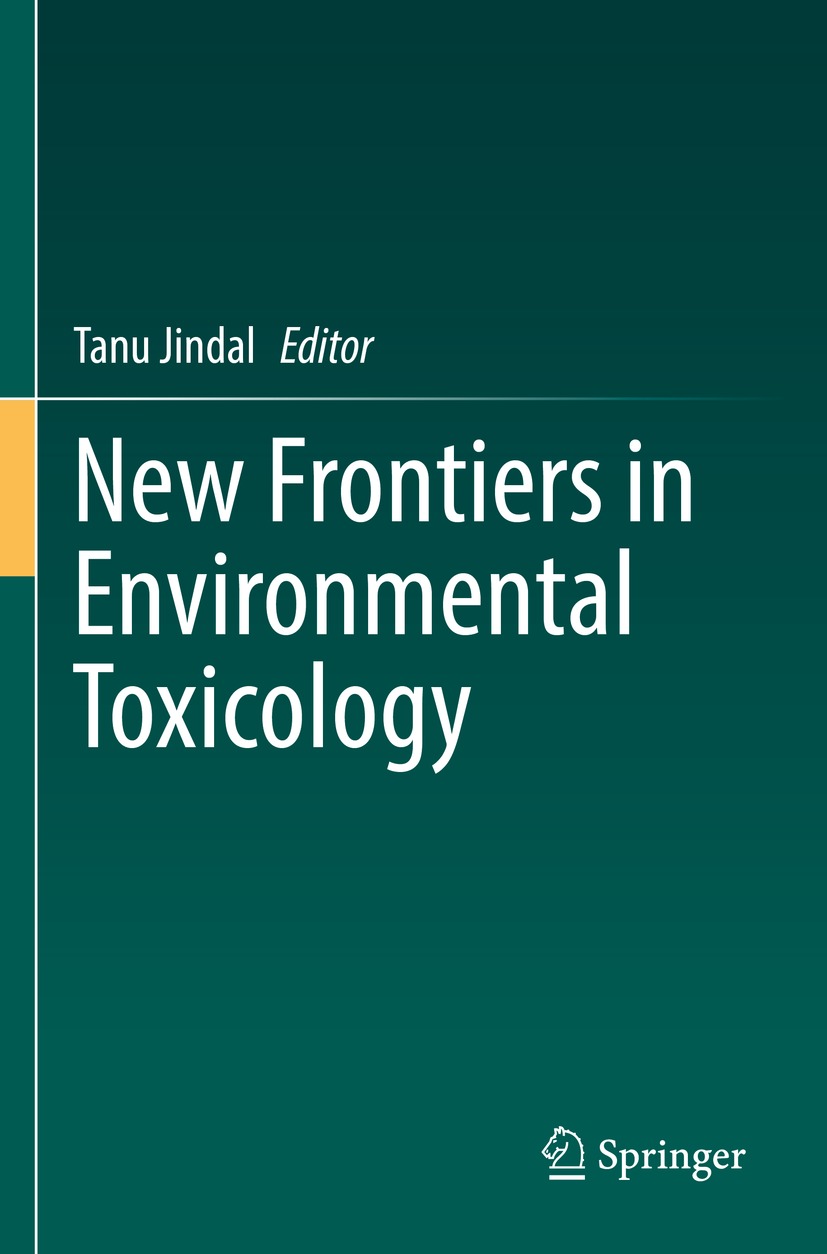Editor
Tanu Jindal
Institute of Environmental Toxicology, Amity University, Noida, Uttar Pradesh, India
ISBN 978-3-030-72172-5 e-ISBN 978-3-030-72173-2
https://doi.org/10.1007/978-3-030-72173-2
The Editor(s) (if applicable) and The Author(s), under exclusive license to Springer Nature Switzerland AG 2022
This work is subject to copyright. All rights are solely and exclusively licensed by the Publisher, whether the whole or part of the material is concerned, specifically the rights of translation, reprinting, reuse of illustrations, recitation, broadcasting, reproduction on microfilms or in any other physical way, and transmission or information storage and retrieval, electronic adaptation, computer software, or by similar or dissimilar methodology now known or hereafter developed.
The use of general descriptive names, registered names, trademarks, service marks, etc. in this publication does not imply, even in the absence of a specific statement, that such names are exempt from the relevant protective laws and regulations and therefore free for general use.
The publisher, the authors and the editors are safe to assume that the advice and information in this book are believed to be true and accurate at the date of publication. Neither the publisher nor the authors or the editors give a warranty, expressed or implied, with respect to the material contained herein or for any errors or omissions that may have been made. The publisher remains neutral with regard to jurisdictional claims in published maps and institutional affiliations.
This Springer imprint is published by the registered company Springer Nature Switzerland AG
The registered company address is: Gewerbestrasse 11, 6330 Cham, Switzerland
About the Book
New Frontiers in Environmental Toxicology is an important book with emphasis on radiation toxicology, polar ecotoxicology, plastic toxicology, microbial toxicology, nanotoxicology, and pesticide toxicology.
The book aims to enlighten the reader on toxic pollutants in the environment and their harmful effect on human health and nature.
It focuses on the electromagnetic field of mobile phone radiation, polar Antarctica contamination, cyanobacteria extracts, phthalate ester in plastic, nanotoxicology exposure, and prophylactic approaches for OP poisoning effects on human health and ecosystem.
The book contains important aspects of environmental toxicology, features, characterization, applications, environmental routes for dispersion, nanotoxicity, ecotoxicity, and genotoxicity of nanomaterials have been discussed.
The present need is to discover novel sources of drugs, particularly natural resources which do not to have adverse effects on human beings and society. A search for these organisms for medicinal purposes has revealed important chemical prototypes in finding new agents, stimulating the use of refined physical techniques and new syntheses of molecules with the pharmaceutical application for human welfare.
We have discussed the toxicity of POPs in Antarctica, which is due to anthropogenic activities such as tourism and scientific activity. The presence of these persistent pollutants in Antarctica is an alarming situation and needs to be studied further to maintain its pristine environment. The presence of these persistent pollutants may be attributed to anthropogenic sources, orographic effects, migratory birds, and biomagnification.
Organophosphate pesticides are potent nerve agents. Improper use and poor monitoring lead to intentional and unintentional exposures. Most suicide cases are due to intentional consumption of OP. The book has covered the usage, consumption, and pathophysiology of OP exposure as well as recent advances in the prophylactic approach to combat human poisoning. It has also discussed the usage of oximes and their limitation, which is a major drawback in the treatment of OP poisoned cases.
Phthalates are esters of phthalic acid, compounds mainly used as plasticizers. Phthalates are widely used chemicals that are of significant research interest as their exposure causes various consequences for human health. The content discusses the toxicity of phthalates and its potential risks to human health.
We have also covered the important topic of electromagnetic field mobile phone radiation toxicity, where we have discussed the biological and health effects of electromagnetic fields (EMFs); it is usually the case that biology and health science are of the first concern, and engineering and physics often come second.
The book has sufficient up-to-date research and new critical perspectives of interest.
Contents
Neha Singh and Tanu Jindal
Laxmikant Bhardwaj and Tanu Jindal
Arjun Suresh and Tanu Jindal
Abhishek Chauhan , Anuj Ranjan , Rupesh Kumar Basniwal and Tanu Jindal
Alishba Tanya John , Shikha Wadhwa and Ashish Mathur
Rupesh Kumar Basniwal , Anuj Ranjan and Abhishek Chauhan
Devendra Kumar , Anuj Ranjan , Abhishek Chauhan , Dhan Prakash and Tanu Jindal
Anuj Ranjan , Abhishek Chauhan and Tanu Jindal
Shalini Thakur , Khushbu Gulati and Tanu Jindal
About the Editor
Tanu Jindal
completed her PhD in ecotoxicology from the Department of Zoology, University of Delhi, in 1999. She is group additional pro vice chancellor (R&D) and director of Amity Institute for Environmental Toxicology, Safety and Management (AIETSM) and Amity Institute of Environmental Sciences (AIES) at Amity University, Noida. She is responsible for PhD, MSc, and BSc environmental science courses to promote environmental research and studies with syllabus covering important and current area of environmental science. She has filed six patents on lysimetric-device, apparatus to estimate the loss of xenobiotics by volatilization and mineralization, natural pesticide, photochemical method to dispose of dilute pesticide waste and cost effective water testing kit. Prof. Jindal has completed projects such as Yamuna, Hindon, Ghagghar River and groundwater contamination through pesticides, MoEF&CC; Contamination of Soil and Groundwater through Leaching of Drains in Delhi, MoES; Groundwater Contamination of chlorpyrifos in Soils at Different pH with CWRDM, DST; Environmental Monitoring Studies at Antarctica, NCAOR, Goa; and Impact of Electro Magnetic Radiation, DST. Her recent initiatives are projects such as Development of Lysimeter, DST; Air Pollution Monitoring through CAAQMS-UPPCB; and Development of Emission Factors, CPCB. Establishment of the Pesticide Referral Laboratory and MRL fixation of pulses and spices were her research endeavors at ICAR. Her areas of expertise are ISO-17025, GLP-studies, radio and stable isotope tracer techniques, and GCMS and LCMS studies. She taught pesticides chemistry and toxicology at Delhi University for 7 years to MSc students. Prof. Jindal holds membership of eminent scientific societies. She has traveled extensively nationally and internationally presenting papers and has publications in refereed journals with high impact factor. She has published more than 38 papers in reputed journals and has been serving as an editorial board member of repute. Editor of The Year Award 2017 by MTRES, Excellence in Research and Teaching Award 2017 by National Environmental Science Academy, prestigious Scientist of the year Award 2015, Environmentalist of the Year Award 2014 by NESA, New Investigator Award presentation at ACS, DST Young Scientist Award Project are to her credit. She has received travel awards from CSIR, DST, and INSA.

